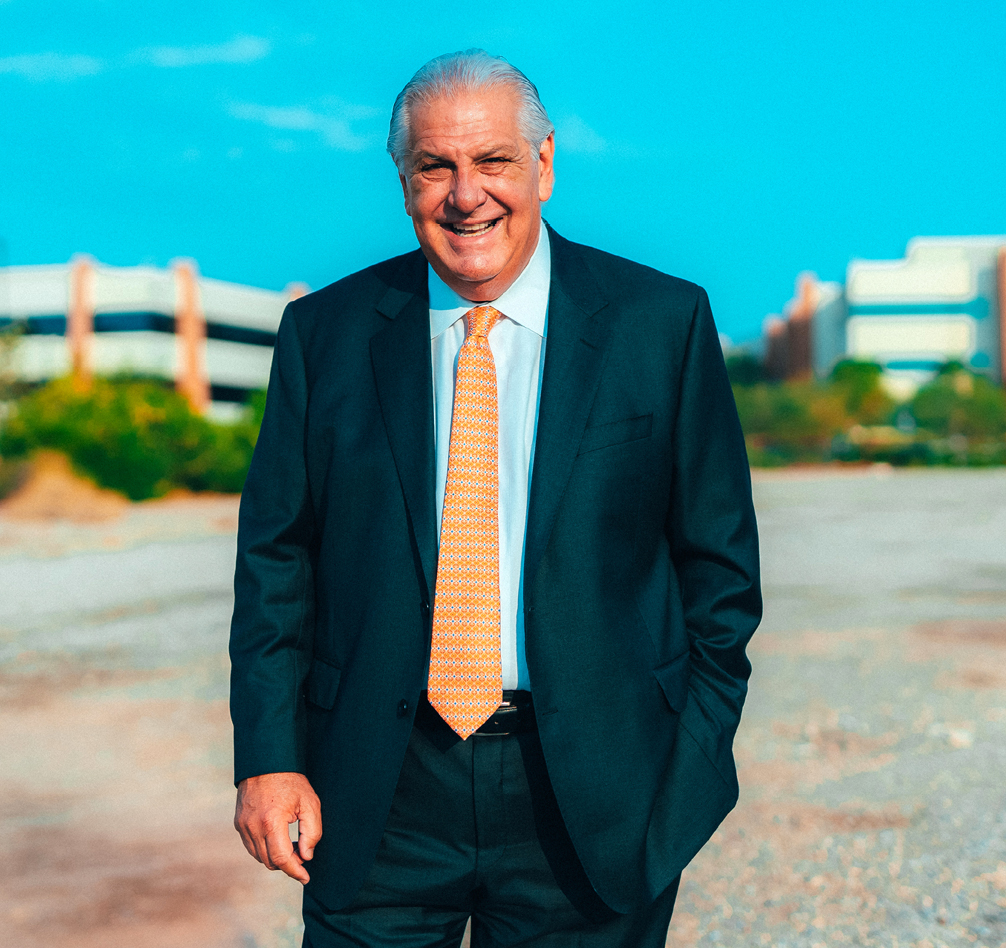Dr. Pedro “Joe” Greer, Jr.

After an hour of chatting, Dr. Pedro Jose Greer gently admonishes someone for referring to him as Dr. Greer. “Joe,” he says, smiling. “I looked at my birth certificate. There was no ‘doctor.’”
This isn’t false modesty or a refutation of his credentials, and while it may seem like a practiced line, it sums up a lot of what you need to know about Joe and about his approach to the modern medical system, a system he is definitely trying to change as he enters his second year as the Founding Dean of the College of Medicine at Roseman University of Health Sciences.
For the 65-year-old physician, rewriting the rules is nothing new, he’s been doing it since high school, long before he started his medical career. Back then, in the early 70s, Joe attended a Catholic school where, as he says, the football team was so bad, the “priests didn’t pray for victory, they prayed for no injuries.” This was a team on which the young Greer played offensive center and outside linebacker. Typical jock. Except… “I was flipping between being a hippie and playing football,” he recalls. “I stood up at the pep rally with a McGovern sign…They did not let me play the first half of the game.”
This dichotomy, though, seems to punctuate his entire life. Even as he describes his Cuban-American upbringing (he came to the US with his family in the early 60s) he also points out that he’s “one of four Cuban democrats of my generation.” This liberal ideal comes from his parents. His father, a first-generation high school graduate, worked his way through medical school and his mother campaigned for Jimmy Carter but most importantly, he was raised with the maxim that “we were supposed to take care of people.” As a catholic, Greer was brought up to believe in a “deep sense of social justice.” However, this was in the late 60s, early 70s, during the height of the Vietnam War and in his high school, they did not require the students to stand for the pledge of allegiance if they were opposed to the actions taking place in Southeast Asia. So, from the beginning, Greer was taught it was vitally important to stand up for what you believe.
And one of the things he believes is that no one should ever suffer or die alone. Not if he can help it. The first challenge to this ideology came during Joe’s second month of interning, when a man came in who was dying of tuberculosis. The man’s identification wrist band only had his name, a date of birth which was probably incorrect and no address, meaning they had found him on the street. Vowing to uphold his promise, Greer went to the only two homeless shelters in Miami at the time to try and track down the man’s family or friends. In that, he was unsuccessful. What he did find, though was “a world of poverty that I didn’t know existed in my own country.” His plans up until that point had been to go and practice medicine in a third world country, but then he saw this and he couldn’t believe his eyes. He knew he had to stay and try to make things better at home.
From that point, you can see how the decisions pushing his career forward have all been about achieving that goal. Joe’s choice to specialize in gastroenterology/hepatology stems from learning that Cubans, like him, had twice the incidence of liver cancer than the rest of America, which was caused by hepatitis C.
Then there were the homeless clinics he started; and the medical school in Miami in 2009. And each step of the way, he was constantly trying to change the way training and medicine were seen in this country. He asks uncomfortable questions, questions which point to the problems with the system, questions like “How do we train our physicians to be humble and empathetic?” One way he does this is by actually forbidding a specific question: “We never let them ask how do you feel?” Instead, his students are taught to ask “what is your most urgent need?” For Greer, this takes the doctor off the pedestal and puts the control of the situation back on the patient. As he explains, with a sly grin, that as a gastroenterologist, “in all these years, asking people what their most urgent need, was much to my chagrin, nobody said a colonoscopy.” Instead, the answers to this question are more mundane, things like “I might lose my job,” or “I’m being evicted,” or “They’re foreclosing on my house.” The reason being so a student can fully understand the social determinants of inequality…that 80 to 90% of the diseases in this country have a non-biological point of origin.
Now, this man, who was once short-listed to be surgeon general and received the Presidential Medal of Freedom in 2009 from President Obama is in the Las Vegas community to once again change the paradigm of what a medical school can and should be. He’s focused on diversity and making systemic changes, literally from the ground up. At Roseman, he plans to look at a number of different factors for the students he admits. “We need to produce a socially accountable, culturally humble, empathetic individual that is going to be a great clinician,” he explains. “Because one of the things that we have lost is doctors don’t listen.”
Joe Greer does listen. And he understands. He is an unabashed liberal who has a big laugh and can easily be mistaken for an old world mafioso (something he takes full advantage of when dining out and, if you ever meet him, you have to ask about the Sinatra picture!). And he wants to make the world a better place.
I only spoke with him for an hour, but he’s got me thoroughly convinced he’s going to do it.
